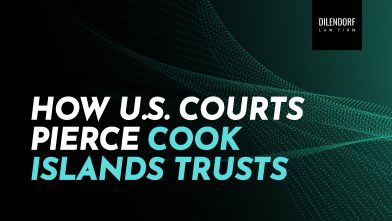Cook Islands Trusts: Legal Risks Every Client Should Know
Considering a Cook Islands Trust? Know the Legal Risks First
Offshore jurisdictions are often associated with tax havens, and perceived as remote, inaccessible, and beyond the reach of U.S. courts. But are they really as invulnerable as they are often portrayed?
The so-called “Old and Cold” Cook Islands trusts, when properly established and structured, can offer long-term asset protection. However, without careful planning, the trusts may fail to achieve their intended protective purpose.
Cook Islands trusts have been a recurring subject in bankruptcy cases, often involving allegations of fraudulent transfers, asset protection strategies, and disputes over the control and repatriation of trust assets.
The following cases demonstrate various aspects of courts’ scrutiny and their efforts to balance creditor protection with the prevention of debtor misconduct.
In re Lawrence: The timing and structure of the trust suggested an attempt to frustrate creditor claims
The case of In re Lawrence, 279 F.3d 1294 (11th Cir. 2002) constitutes an important ruling on the limitations of foreign asset protection trusts as shields against U.S. bankruptcy court orders. This case firmly establishes that a debtor cannot evade judicial authority simply by transferring assets into a foreign self-settled trust.
In this matter, Mark Lawrence attempted to circumvent a $20 million arbitration award against him by transferring more than $7 million into a Cook Islands trust prior to initiating bankruptcy proceedings. The timing and structure of the trust suggested an anticipatory attempt to frustrate creditor claims.
The court noted that the trust had been structured in anticipation of creditor claims and that Lawrence retained influence—particularly through his ability to remove and replace protectors. The Court of Appeals agreed with the bankruptcy court’s finding that Lawrence had created the trust as “an obvious attempt to shelter his funds from an expected adverse arbitration award,” and retained the ability to influence the trust’s administration:
[A]t the time Lawrence became an excluded person under the trust he retained the ability to appoint a new Trustee who would have the power to revoke the excluded person status at any time. (Lawrence v Goldberg (In re Lawrence), 279 F3d 1294, 1300 [11th Cir 2002])
The Court of Appeals affirmed the bankruptcy court’s finding of civil contempt against Lawrence for his failure to repatriate the assets.
The Eleventh Circuit’s decision highlights the principle that a debtor cannot evade compliance with court orders by relying on the structure of foreign asset protection trusts, especially when the debtor retains significant control over the trust.
In re Cork: The bankruptcy court examined the timing of the transfers, the lack of consideration in return for $3.1 million transfer, and Cork’s continued control and benefit from the trust
Cork v. Gun Bo, LLC (In re Cork), 566 B.R. 237 (D. Ariz. 2017), illustrates how U.S. courts analyze transfers to offshore trusts under fraudulent transfer law and discharge denial provisions of the Bankruptcy Code (11 U.S.C.S. § 727(a)(2)).
“During state court litigation, […] Cork and his wife transferred $3.1 million to a Swiss bank account held by a Cook Islands trust […] controlled by Cork. The state court found that the transfers were fraudulent and made “in order to secret funds from” [creditors]” (In re Cork, 566 B.R. at 247).
The court concluded the transfers were made with actual “intent to hinder, delay or defraud” and denied Cork a discharge under §727(a)(2). This case emphasized that using foreign trusts does not shield debtors from traditional fraudulent transfer analysis and that courts can issue turnover orders and contempt sanctions even when assets are abroad.
SEC v. Solow: The principle of “Prior Access Equals Present Control” was applied, holding that even indirect or retained control over trust assets can subject those assets to creditor claims
In SEC v. Solow, 682 F. Supp. 2d 1312 (S.D. Fla. 2010), Solow attempted to shield assets from a securities fraud judgment by placing them in a Cook Islands trust. He argued that he had no control over the trust, saying he “[didn’t] have a dollar to [his] name,” and could not comply with the court’s disgorgement order.
Despite these claims, the court found: “that Mr. Solow rendered himself unable to pay the Final Judgment by shifting assets to his wife and by abdicating all financial responsibility to her” (Id. at 1323)
The court also established that Solow had used trust assets to pay taxes and personal expenses, which undermined his credibility. Relying on Affordable Media and Lawrence, the court held that any past access to trust assets can establish control and rejected his impossibility defense: “Mr. Solow’s inability defense is unavailing because such inability was self-created.” (Id. at 1330).
The key point: The court stated, The Eleventh Circuit adheres to the “time-tested adage: if it walks like a duck, quacks like a duck, and looks like a duck, then it’s a duck.” Mr. Solow still lives a luxurious lifestyle, enjoying the benefits of the money he has made over the years, yet he refuses to repay the victims of his fraud. Such a situation cannot stand. (Id. at 1334).
This illustrates that a debtor who has ever benefited from a Cook Islands trust will face an uphill battle in proving lack of control, especially if distributions were made with the debtor’s knowledge or participation.
In re Allen: The Florida Bankruptcy Court concluded that the defendants acted in bad faith, granted preliminary injunctive relief, and ordered the repatriation of funds
Allen received over $6 million from Advanced Telecommunication Network. When the company later obtained a court ruling declaring the transaction fraudulent and ordering the funds returned, Allen attempted to shield the money by transferring it to an offshore trust and filing for bankruptcy.
Despite Allen’s bankruptcy filing, the court made it clear: U.S. courts will look past offshore structures when enforcing judgments — especially when those structures are used to conceal assets following a fraudulent transfer.
The court granted preliminary injunctive relief and ordered that the funds be repatriated. When the Allens failed to comply with the court order, the Florida Bankruptcy Court twice held Daniel Allen in contempt of court. (In re Allen, 768 F3d 274, 277 [3d Cir 2014])
The court emphasized that substance controls over form: if the debtor effectively maintains control over the trust’s assets, the protections provided by the foreign trust structure will be disregarded, and the assets may be reached to satisfy creditor claims.
Netsphere v. Baron: The court emphasized that control over assets—not just formal title—determines whether a transfer can be set aside as fraudulent.
In Netsphere, Inc. v. Baron, 703 F.3d 296 (5th Cir. 2012), the Fifth Circuit Court of Appeals affirmed U.S. jurisdiction over assets transferred by the debtor to a Cook Islands trust. While not a direct challenge to the trust itself, the court’s willingness to disregard formal offshore protections in favor of equitable remedies reflects the same enforcement approach seen in other Cook Islands trust cases.
The court confirmed that Baron attempted to move U.S.-based assets to a foreign trust, of which he was the sole beneficiary, and ordered the repatriation of funds to secure his obligations:
Baron planned to move assets that were at the time subject to jurisdiction in the United States to a trust in a foreign country […] and Baron is the trust’s sole beneficiary. […] [T]he assets being transferred out of the United States would have been the principal source of payment for his allegedly unpaid attorney fees. […] [T]he bankruptcy court ordered Baron to request from the trust that $330,000 be deposited with the bankruptcy trustee as security, to be held until further court order. The money was deposited and held “to pay [Baron’s] obligations.” (Netsphere, Inc. v Baron, 703 F3d 296, 303 [5th Cir 2012])
This case reinforces that U.S. courts will assert jurisdiction and compel repatriation when offshore trusts are used to avoid legal obligations.
Why Careful Planning Is Essential When Creating a Cook Islands Trust
The creation of a Cook Islands trust requires careful planning to mitigate the risk of legal challenges under U.S. law. Creation of the trust and any asset transfers to it must be carefully structured to withstand scrutiny under U.S. fraudulent transfer statutes, bankruptcy laws, and equitable principles related to constructive trusts.
- Timing of transfers is critical, as courts often view transfers made shortly before creditor claims arise as attempts to defraud creditors, potentially resulting in fraudulent transfer claims.
- Courts apply the principle of substance over form, meaning they will pierce formal offshore structures if the settlor retains control or influence over the trust, disregarding the protections nominally offered by the trust.
- Past access to or benefit from trust assets can also undermine any claim of inability to comply with court orders, as courts may find that prior control establishes ongoing liability.
- Failure to comply with court orders, such as repatriation orders, can expose the settlor to severe sanctions, including contempt findings, fines, and even imprisonment.
- Finally, foreign trusts do not guarantee immunity from U.S. courts; as demonstrated in multiple cases, courts will assert jurisdiction and enforce repayment obligations when offshore trusts are used to evade legal responsibilities.
Careful, proactive legal advice and planning are therefore essential to maximize the protective benefits of a Cook Islands trust.
How Dilendorf Law Can Help
At Dilendorf Law Firm, we provide clients with independent risk assessments and feasibility studies for offshore asset protection structures, including Cook Islands Trusts.
Whether you’re seeking to protect cryptocurrency, public or private company stock, real estate, or other appreciated assets, it is critical to carefully evaluate the legal, tax, and enforcement risks before proceeding with any offshore planning.
Our firm has in-depth knowledge of the U.S. case law scrutinizing these trusts and provides clients with tailored advice that integrates compliance, control, and long-term viability.
Before transferring assets to a foreign trustee, make sure you fully understand the legal implications—and whether a domestic structure may serve your objectives more effectively.
Contact Max Dilendorf for a confidential consultation to determine whether a Cook Islands or other offshore trust is the right solution for your estate and asset protection goals. Contact us by email at info@dilendorf.com or call 212.457.9797.









